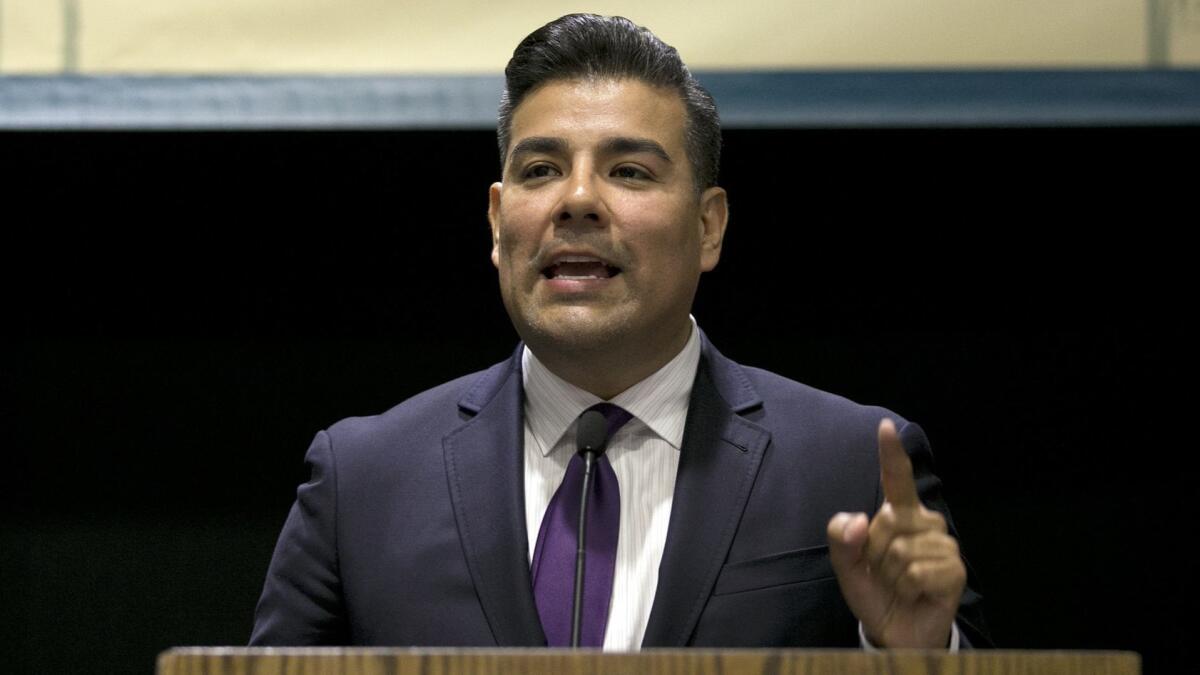Editorial: California Insurance Commissioner Ricardo Lara has a taxpayer-funded second home

When he took over as the state’s top insurance regulator this year, Ricardo Lara decided not to relocate permanently to Sacramento, the seat of California’s state government. Instead, he remained in Southern California, moving from Bell Gardens, where he lived while serving in the state Senate, to the big city of Los Angeles.
The decision was a tad unusual, given that the state capital is where policy gets done, but it wasn’t unreasonable. The Department of Insurance, which Lara leads, operates three main offices in California, the largest of which is in Los Angeles. What is unreasonable is that Lara continues to rent a full-time apartment in Sacramento — and sticks taxpayers with its cost.
Under an arrangement first reported by Politico, Lara claims the maximum reimbursement for staying in his own apartment when he travels to Sacramento for work. It’s not clear if it’s legal; Consumer Watchdog, an advocacy group that intervenes in cases before the insurance commissioner on behalf of insurance buyers, believes it constitutes a theft of public funds. The organization on Friday sent a letter to Atty. Gen. Xavier Becerra and the district attorneys in L.A., San Francisco and Sacramento asking them to investigate.
This certainly isn’t a great look for an elected official who is trying to repair the damage he inflicted on his reputation with a series of missteps in the opening months of his first term. Whether or not his Sacramento arrangement is strictly legal, he appears to be gaming the system in order to pay for a second home for his personal use. None of the other seven statewide officers who live elsewhere and travel to Sacramento do the same. Lara should discontinue this practice immediately. If he wants to maintain a full-time house in two cities, he can pay for it out of his $161,342 annual salary.
Apparently this is the same apartment that Lara rented when he was a legislator. Many lawmakers rent units in Sacramento because their job requires them to maintain a residence in their home districts while also spending several months a year in the capital when the Legislature is in session. The Legislature pays them a per diem while in Sacramento to use for housing, meals and other costs.
But state officers don’t represent a district; they head a state department. They’re expected to live in one place — typically Sacramento — and get reimbursed for their individual trips when required to work away from their office.
Lara’s spokesman said that the insurance department’s lawyers vetted the practice, and that furthermore it may save taxpayers money if Lara works in Sacramento more than seven days a month. But if it’s so efficient, why don’t any other state officers do it? Because it’s unseemly.
Worse, the revelation about Lara’s Sacramento digs comes on the heels of other questionable actions by the insurance commissioner. Earlier this year, it was revealed that Lara accepted thousands in campaign donations from insurance industry representatives after he’d promised not to. He later denied any knowledge of the donations despite serving as his own campaign treasurer, suggesting that the contributions had been collected in error. But new reporting by the Sacramento Bee on Tuesday indicates he knowingly attended campaign-related meetings with insurance executives from those companies.
This apparent lack of truthfulness is concerning enough from the man elected to make sure that any changes in insurance premiums are fair and warranted. But after he took the contributions, Lara directly intervened in some premium disputes, reversing decisions by administrative judges to the benefit of a company whose executives had donated thousands to his reelection campaign.
Lara seems to understand that even if his actions aren’t illegal, they weren’t exactly proper. Just days before the revelation about his Sacramento apartment, Lara issued a public apology, saying, “These failures are not consistent with my personal values.” He outlined four steps he would take in order to restore the trust of Californians, including regularly releasing his calendar (which his office has been promising but failing to produce for months) and collecting no campaign donations through the rest of the year. Those are good steps for Lara to take, but he should add one more: Stop billing the public for his second home.
More to Read
A cure for the common opinion
Get thought-provoking perspectives with our weekly newsletter.
You may occasionally receive promotional content from the Los Angeles Times.










